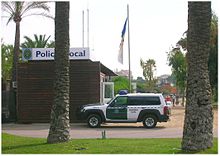Police (spain)
The police system in Spain is complex due to the political structure of Spain. It essentially comprises four types of police bodies:
- the Guardia Civil ( gendarmerie or "civil guard"), which is subordinate to the Ministry of Defense and the Ministry of the Interior and is organized militarily ,
- the State National Police ( Cuerpo Nacional de Policía - CNP) of the Ministry of the Interior,
- the police forces of the Autonomous Communities ( Policía Autonómica ) that have been set up in the Basque Country , Catalonia , Navarre and, since 2010, in the Canary Islands ,
- as well as the municipal and city police (called Guardia Urbana , Policía Local or Policía Municipal ).
As special units exist within the CNP, for example, riot police units ( Unidades de Intervención Policial - UIP) and so-called "Special Security Task Force" ( Grupos Operativos Especiales de Seguridad - GOES), which together with the (roughly comparable to the German GSG 9 ) " Special Operations Group "(GEO) serve primarily to counter terrorism .
The demarcation of responsibilities between the Guardia Civil and the National Police is very complicated and not always easy to understand. Both police forces have tasks assigned to them exclusively throughout the state. In the case of the Guardia Civil, these are, for example, the enforcement of the gun law, the monitoring of road traffic outside built-up areas, border and coastal protection, the transport of prisoners and the police tasks in the field of environmental protection. The national police, on the other hand, are exclusively responsible, among other things, for issuing identity cards and passports, monitoring entry and exit, for tasks of the immigration police and the prosecution of drug-related crime. With regard to the other police tasks (especially the classic maintenance of public safety and order), the areas of responsibility are territorially delimited: the National Police perform these tasks in the provincial capitals and other cities designated by the government, the Guardia Civil on the rest of the national territory ( ie "in the country") and in the coastal waters. Both police forces perform both protective and criminal police tasks.
In the autonomies that have their own police force, the duties of the Guardia Civil i. d. R. noticed by the autonomous police. The Autonomous Police of the Basque Country is called Ertzaintza , that of Navarra Policía Foral (Spanish) or Foruzaingoa (Basque), that of Catalonia Mossos d'Esquadra and that of the Canaries Policía Canaria .
Due to the complicated organization, police work in Spain is often made more difficult by conflicts of competence . For a long time there has been a call for the creation of a unified police force ( Policía Única ), at least for those parts of the country that do not have an autonomous police force.
history
The Policía Nacional was founded in 1824 by a decree of King Ferdinand VII , who set up the Kingdom's General Police. The Guardia Civil was then founded in 1844 during the reign of Queen Isabella II by Javier Girón , 2nd Duque de Ahumada and then Military Inspector General.
Under Franco , in particular, the Guardia Civil was used as an instrument of repression against politically dissenters. In general, it was the regime’s instrument to demonstrate presence and strength to the rural population.
The current structure of the Spanish police force was established in the 1978 constitution . The tasks of the Policía Nacional, organized in the Cuerpo Nacional de Policía, and the Guardia Civil have since been partially taken over by the police forces of the Autonomous Communities. The Ertzaintza has been the autonomous police of the Autonomous Community of the Basque Country since 1982 , the Policía Foral ( Foruzaingoa ) has been the autonomous police of Navarre since 1982 and in 1983 the Mossos d'Esquadra gradually took over the executive power in the territory of Catalonia.
literature
- Fabian Hinrichs: The law of the Spanish prison police, Ergon-Verlag 2004



